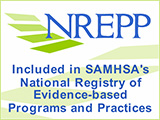|
|
It is critical that advocates be adequately trained and prepared for this work, and that they receive ongoing supervision throughout their interventions. To support the successful implementation of this project, we have developed a 40-hour training workshop for staff, so that they can properly train and supervise the paraprofessional advocates who will work directly with domestic violence survivors and their children.
Accredited Trainers of the CAP Model are available to train individuals who will then train and supervise the community advocates. A typical training program for individuals interested in training and supervising advocates includes 40 hours of education including a webinar, preparation for in-person training (reading manuals) and a 3-4 day face-to-face training (the number of days can be modified depending on each organization’s situation). Throughout the training, active teaching techniques provide abundant opportunity for practice (e.g., modeling, role play, experiential exercises, and group discussion).
These trainings are individualized to each organization’s needs, but generally consist of:
- An initial webinar providing an overview of CAP
- Three (or four) days of in-person training (with all training materials provided)
- A follow-up webinar (if there are materials that need to be covered post-training)
- Four 2-hour telephone consults after training and supervision of advocates has commenced, in order to individualize support and maximize fidelity to the model
Participants who successfully complete the training become Certified CAP Supervisors. Certified CAP Supervisors receive a comprehensive set of materials that will allow them to then train paraprofessional advocates. Materials include:
- A supervisor training manual
- Comprehensive training materials (powerpoint presentations, handouts, exercises, other tools)
- Advocate manuals
- Tools to evaluate the effectiveness of CAP
- Tools to measure fidelity to the CAP model
- Certificate templates to award to advocates who successfully complete the CAP training and become Certified CAP Advocates
Who Should Attend the Training?
It is expected that anyone training and supervising community advocates will have, at a minimum, the following four qualifications:
- Completed a similar 40-hour training for domestic violence advocates or other intensive training in a behavioral health related field that included coverage of domestic violence;
- Worked in the field as an advocate (or in a comparable position) for at least three years themselves;
- Successfully worked in a supervisory capacity; and
- Possesses strong training and facilitation skills.
What prior qualifications are needed of potential advocates?
This intervention has primarily relied on female college undergraduate students to date. Most of those women had no prior experience as advocates or within the domestic violence field. This lack of experience (and lack of advanced degree) has not been a deterrent to their success. Advocates learn everything they need to know during training and supervision. It is strongly recommended that only women work as community advocates, as the presence of a man in this role (which includes working within women’s homes and with their children) poses an increased risk of:
- Inciting further abuse by the batterer;
- Triggering prior traumas for women; and
- Making it more difficult for the survivor to share intimate details about her experiences that are often more easily shared with other women.
Trainings can be offered individually or in group settings. Please contact one of the CAP Accredited Trainers to discuss training and technical assistance opportunities and costs.
Accreditation Process
Upon successful completion of the Supervisor Training, participants will receive an Instructor Certificate of Accreditation to train advocates in the Community Advocacy Project model. Accreditation is valid for two years from the date of training. In order to get re-accredited, participants must submit the following documentation:
- Number of advocates trained
- Actual fidelity surveys (de-identified) documenting adequate fidelity to the CAP model (information about this will be provided to Certified CAP Supervisors post-training)
Sharing Materials
Accredited advocacy supervisors will be given access to a password-protected site containing updated training and supervision materials. We ask that supervisors share newly created or derived works (e.g., translations, new training tools, new assessment materials) so that we can all continue to learn from each other.
To find out more about the CAP Trainings, please contact one of the CAP Accredited Trainers.
Latest News

CAP Disseminated in Monterrey, Mexico
With funding provided by the United States Agency for International …Read More »
Examining the Impact of Mobile Advocacy and Flexible Funding on Domestic Violence Survivors’ Housing Stability and Well-being
Dr. Cris Sullivan, who originally developed the Community Advocacy Project …Read More »
Developed by:
Director, MSU Research Consortium on Gender-based Violence
Professor, Ecological/Community Psychology
Michigan State University


